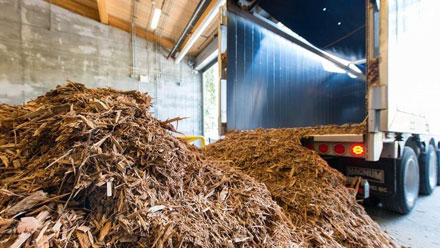
Most people in New Zealand are not aware that technology has been commercialised in the United States for the production of fully drop-in renewable diesel made from cellulosic feedstocks. Source: Timberbiz
This renewable diesel is a direct substitute for mineral diesel and meets all of the New Zealand specifications other than density (kilograms per litre). But it makes up for that by having a high energy density per kilogram so that the amount of energy per litre of fuel is equal to, or in some cases better than, that of fossil fuel diesel.
According to Miscanthus New Zealand Limited (MNZ) New Zealand’s Minister of Energy, Megan Woods, needs only a small tweak made to the New Zealand diesel specifications to account for the greater importance of energy density rather than physical density.
Miscanthus New Zealand Limited was originally approached by a US company REEP Development about production of renewable diesel as a result of Miscanthus being a very suitable feedstock. But with the connection of MNZ staff to the New Zealand forest industry, it was immediately obvious that renewable diesel also represents an opportunity for forest industry processors – in the same way that it represents an opportunity to people who are prepared to grow Miscanthus on a commercial scale.
Peter Brown, spokesman for Miscanthus New Zealand Limited said: “Following up on implementation of this renewable diesel production technology on a regional basis means that not only do significant markets for Miscanthus open up regionally, but in addition the New Zealand forest industry can be provided with an excellent new long term local market for many of its processing residues.
“What’s more, in regions where there is a poor market or no market at all for pulp logs and low quality wood, production of renewable diesel can provide a very viable commercial outlet for these forest products.”
All the financial projections done to date in New Zealand have included prices for the feedstock that are very competitive with existing forest industry markets and that can be guaranteed into the future.
A successful trial has been done in the US on the ability of this technology to utilise as feedstock, radiata pine material from New Zealand. Miscanthus has also been tested through the system and shown to be a suitable feedstock
One of the plants in the US that is using this technology for renewable diesel production is routinely using low value small log material as its primary feedstock. So, there is potential in New Zealand for forest industry processing residues/pulp logs to be turned into renewable diesel and for Miscanthus to supplement that feedstock supply.
The scale at which this technology works is small enough that – 50,000 tonnes of feedstock dry matter per year – such production plants can and will be established regionally so that the feedstock is produced regionally and the resulting renewable diesel fuel is also used regionally.
“One of the other big advantages of production of renewable diesel in New Zealand is that as long as the feedstock supply is on a fixed 12 month (or more) contract price – indexed only to New Zealand inflation – and the staff are employed on the same basis, it will be possible to provide renewable diesel customers with diesel that also comes with a 12 month fixed price,” Mr Brown said.
“That price can be competitive with current and recent commercial diesel prices. Can anybody imagine any existing fossil fuel diesel supplier offering a fixed price guarantee for diesel for the next 12 months?”
In fact, with the renewable diesel production being regionally based through New Zealand the fixed price could if needed, be for longer than a year as long as the feedstock supply and employment contracts were similarly indexed only to inflation for the same period.
Such price certainty must constitute a huge advantage for major diesel users, allowing them to escape the international oil price and the USD:NZD relativity.
One of the other advantages of this particular technology is that it also produces valuable co-products. These have excellent and growing markets with prices that are expected to rise significantly, so they help to carry the costs of the renewable diesel plants.
Diesel in effect becomes a by-product of the process that produces these other products. This makes the diesel even more flexible in terms of market price and gives more certainty to the ongoing success of this renewable fuel production.







